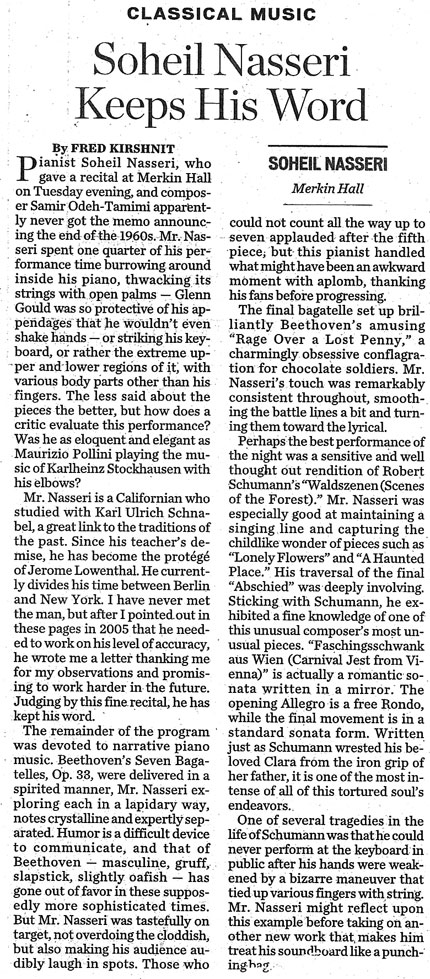Soheil Nasseri Keeps His Word
Fred Kirshnit, The New York Sun
Pianist Soheil Nasseri, who gave a recital at Merkin Hall on Tuesday evening, and composer Samir Odeh-Tamimi apparently never got the memo announcing the end of the 1960s. Mr. Nasseri spent one quarter of his performance time burrowing around inside his piano, thwacking its strings with open palms — Glenn Gould was so protective of his appendages that he wouldn’t even shake hands — or striking his keyboard, or rather the extreme upper and lower regions of it, with various body parts other than his fingers. The less said about the pieces the better, but how does a critic evaluate this performance? Was he as eloquent and elegant as Maurizio Pollini playing the music of Karlheinz Stockhausen with his elbows?
Mr. Nasseri is a Californian who studied with Karl Ulrich Schnabel, a great link to the traditions of the past. Since his teacher’s demise, he has become the protégé of Jerome Lowenthal. He currently divides his time between Berlin and New York. I have never met the man, but after I pointed out in these pages in 2005 that he needed to work on his level of accuracy, he wrote me a letter thanking me for my observations and promising to work harder in the future. Judging by this fine recital, he has kept his word.
The remainder of the program was devoted to narrative piano music. Beethoven’s Seven Bagatelles, Op. 33, were delivered in a spirited manner, Mr. Nasseri exploring each in a lapidary way, notes crystalline and expertly separated. Humor is a difficult device to communicate, and that of Beethoven — masculine, gruff, slapstick, slightly oafish — has gone out of favor in these supposedly more sophisticated times. But Mr. Nasseri was tastefully on target, not overdoing the cloddish, but also making his audience audibly laugh in spots. Those who could not count all the way up to seven applauded after the fifth piece, but this pianist handled what might have been an awkward moment with aplomb, thanking his fans before progressing.
The final bagatelle set up brilliantly Beethoven’s amusing “Rage Over a Lost Penny,” a charmingly obsessive conflagration for chocolate soldiers. Mr. Nasseri’s touch was remarkably consistent throughout, smoothing the battle lines a bit and turning them toward the lyrical.
Perhaps the best performance of the night was a sensitive and well thought out rendition of Robert Schumann’s “Waldszenen (Scenes of the Forest).” Mr. Nasseri was especially good at maintaining a singing line and capturing the childlike wonder of pieces such as “Lonely Flowers” and “A Haunted Place.” His traversal of the final “Abschied” was deeply involving. Sticking with Schumann, he exhibited a fine knowledge of one of this unusual composer’s most unusual pieces. “Faschingsschwank aus Wien (Carnival Jest from Vienna)” is actually a romantic sonata written in a mirror. The opening Allegro is a free Rondo, while the final movement is in a standard sonata form. Written just as Schumann wrested his beloved Clara from the iron grip of her father, it is one of the most intense of all of this tortured soul’s endeavors.
One of several tragedies in the life of Schumann was that he could never perform at the keyboard in public after his hands were weakened by a bizarre maneuver that tied up various fingers with string. Mr. Nasseri might reflect upon this example before taking on another new work that makes him treat his soundboard like a punching bag.



